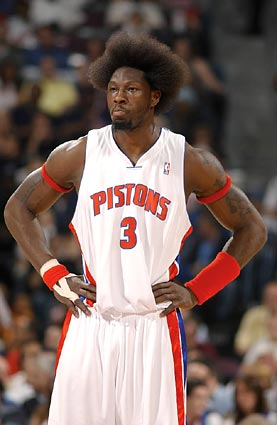
A few years ago, I participated in an NBA Fantasy League. It was the 2001-02 season. The league used 12-man rosters with 10 owners, and five stat categories. There were two games each week, and we set our starting lineups for each game. I won that league, and thought I'd share my strategy with you. Even though most leagues have already had their drafts and started play, there's still plenty of time to make trades and free agent acquisitions.
Entering the draft, I had the third overall pick. Our stat categories were PTS, REB, AST, BLK, and STL. Each player's output in all five categories was added together to get the team total. I prepared my draft sheet and tried to identify players that might be undervalued by the other owners.
In addition to the stat projections, there were two other factors that I used to target players. One was durability. I wanted to make sure that the guys that I drafted had a good chance of missing only a few games. So, I didn't go after guys like Grant Hill. I also wanted players that still had their best years in front of them.
I knew that Shaq would be the first pick. I believe Tim Duncan went second. I decided to buck the trend of taking big men in the first round. With my pick, I took a very young, but talented Tracy McGrady. His prior year stats weren't as high as a few other guys near the top, but because of his youth, he projected to keep improving.
Here was my draft (what I can remember of it):
Round 1 - Tracy McGrady, G
He was the foundation for my team, a Do-It-All contributor who provided good points in all five categories. 76 games played.
Round 2 - Shawn Marion, F
Another young guy who slipped under everyone else's radar. He gave me monster numbers across the board, and played in 81 games.
Round 3 - Ben Wallace, C
A MAJOR coup for me in the draft. Big Ben qualified at center, and slipped to the third round because he didn't put up good scoring numbers. However, I saw the potential for improvement. He put up huge rebound numbers, finishing just behind Duncan in that category. Plus, his durability allowed me to start him every night. 80 games played.
Round 4 - Antawn Jamison, F
This may have been a suspect pick, but it worked out well in the end. Jamison did not have a great first half, and started receiving less playing time as the year went on. However, he picked it up in the second half, and became a force. Many think of Jamison as a scorer only, but he also rebounds well and gets a few blocks. 82 games played.
Round 5 - Darrell Armstrong, G
Another guy who flew under the radar was Armstrong, who finished with good points and assists totals, and also finished in the top five in steals. He also played in all 82 games. His career went downhill pretty quickly after the 01-02 season. Note that my starting five missed a grand total of only nine games.
Round 6 - Antonio Davis, F/C
A vastly undervalued guy who started for Toronto, and gave me quality production at the center position. I used him as a backup at times to Wallace.
Round 7 - Elden Campbell, C
I stocked up on quality big men that fell to the later rounds. The teams that had drafted centers early only felt the need to add one near the end of the draft. That was their mistake. I had three starting centers on my roster who produced. That limited the number of quality centers who were available after this point. Rule #1 of drafting: stock up at positions where quality is scarce. You can use those chips as trade bait later on.
Round 8 - Jalen Rose, G/F
Rose was a consistent contributor in points, rebounds, assists and steals, and even averaged a half a blocked shot per game. The next season was his best.
Round 9 - Anthony Peeler, G
Needing some insurance at the guard position, I grabbed Peeler. He was a decent scorer, but lacked points in the other categories to make him a higher pick. 82 games played.
Round 10 - Aaron Williams, F
This pick didn't really work out as well as I hoped it would. Although Williams didn't miss a game, his per-minute numbers didn't really improve, and he didn't play as much as I thought he might.
Round 11 - Jahidi White, C
More center stock-piling. White ended up with one of the highest rebound/minute averages in the league, although he only averaged about 19 minutes/night.
Round 12 - Tony Parker, G
Mr. Parker didn't really blossom until a few yaers later, but I liked the fact that he was young and played good minutes.
I don't think we scared anybody on paper, because we lacked a lot of big-name players. We were around .500 during the first half of the season, and didn't really gel until the playoffs neared. We cruise through the first round, and then had to face Shaq's team in the best 2-of-3 final round. We lost the first game, but then Shaq got hurt, and we won the next two games for the championship title.
What I learned from that season is that in Fantasy Hoops, the starting five is key. If you draft a solid top six or seven players who don't get hurt, you don't really need much depth. When other teams are trying to replace injured stars, you are still playing your top guys, and that makes all the difference. Also, addressing the issue of position scarcity is important in any draft.
No comments:
Post a Comment